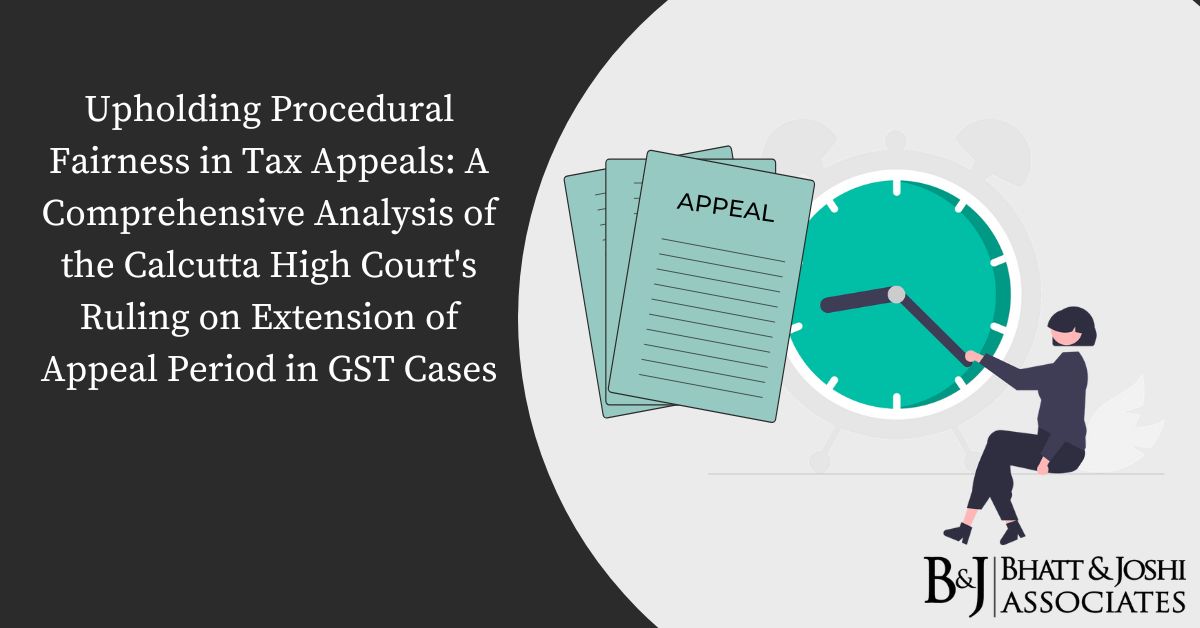
Introduction:
Taxation laws are integral to the functioning of any modern state, providing the government with the necessary revenue to fund public services and infrastructure. However, disputes often arise between taxpayers and tax authorities, necessitating a robust system of appeal to ensure procedural fairness and uphold the rule of law. In the realm of Goods and Services Tax (GST), the issue of Extension of Appeal Period, especially in GST cases, has emerged as a crucial legal question, particularly in cases where principles of natural justice have been violated. The recent ruling by the Calcutta High Court in the case of Jyanata Ghosh v. State of West Bengal sheds light on this issue, emphasizing the importance of procedural fairness and the discretion of the Appellate Authority to extend the appeal period in GST Cases. This article provides a comprehensive analysis of the legal principles involved, the implications of the court’s decision, and the broader significance for tax administration and jurisprudence.
Background:
The case of Jyanata Ghosh v. State of West Bengal arose from a Show Cause Notice (SCN) served to Mr. Jyanata Ghosh (“the Petitioner”) under the Central Goods and Services Tax Act, 2017 (CGST Act). The SCN raised a demand on the Petitioner for an amount of Rs. 40,73,996.84 for the period April 2022 to March 2023. However, the subsequent Order issued on August 11, 2023 (“the Impugned Order”) was tainted by a violation of the principles of natural justice, as the opportunity for a personal hearing was not granted to the Petitioner.
The Petitioner challenged the Impugned Order before the Appellate Authority (“the Respondent”) under Section 107 of the CGST Act. However, the Respondent dismissed the appeal on the ground of limitation, citing the prescribed period for filing an appeal.
Legal Issue: Extension of Appeal Period in GST Cases
The primary legal issue in this case revolves around the discretion of the Appellate Authority to extend the period for filing an appeal, especially in instances where principles of natural justice have been violated. Additionally, the applicability of the Limitation Act, 1963, and its provisions regarding the condonation of delays are central to the legal analysis.
Court’s Decision:
In its ruling, the Calcutta High Court addressed several key aspects:
- Affirmation of Natural Justice Principles: The court emphasized the importance of affording an opportunity for a personal hearing to the Petitioner before deciding on the appeal. It held that the Respondent’s failure to provide such an opportunity constituted a violation of the principles of natural justice. The court’s decision underscores the fundamental right of every individual to be heard and present their case before an adjudicating authority.
- Precedent from Previous Cases: To support its decision, the court relied on previous judgments, such as Murtaza B Kaukawala v. State of West Bengal and K. Chakraborty & Sons v. Union of India. These cases established that delays in filing appeals could be condoned if the principles of natural justice had been violated. By invoking these precedents, the court reaffirmed the importance of consistency and coherence in judicial decision-making.
- Applicability of Limitation Act: The court clarified that the prescribed period for filing an appeal, as outlined in the CGST Act, was not final. It invoked Section 5 of the Limitation Act, 1963, which allows for the condonation of delays in certain circumstances. This interpretation highlights the interplay between different statutes and the need for a harmonious construction to achieve justice.
- Extension of Appeal Period: Based on the above considerations, the court held that the delay in filing the appeal should be condoned. It asserted that the Appellate Authority had the discretion to extend the appeal period, particularly in cases where procedural irregularities had occurred. This ruling reaffirms the principle that procedural fairness should prevail over technicalities, ensuring that litigants are not unfairly prejudiced by administrative lapses.
Implications of Appeal Period Extension
The ruling in the case of Jyanata Ghosh v. State of West Bengal has several significant implications for tax administration and jurisprudence:
- Safeguarding Procedural Fairness: By affirming the importance of natural justice principles and the discretion of the Appellate Authority to extend the appeal period, the court’s decision ensures that litigants are afforded a fair opportunity to present their case. This contributes to the overall integrity and legitimacy of the tax adjudication process.
- Promoting Access to Justice: The court’s interpretation of the law expands access to justice by allowing for the condonation of delays in filing appeals. This is particularly important for taxpayers who may be disadvantaged by procedural errors or administrative delays. By prioritizing substance over form, the court’s decision enhances access to legal remedies for aggrieved parties.
- Clarifying Legal Principles: The ruling provides clarity on the interplay between different statutes, such as the CGST Act and the Limitation Act, 1963. By elucidating the applicability of Section 5 of the Limitation Act in the context of tax appeals, the court sets a precedent for future cases and promotes legal certainty and predictability.
- Upholding Judicial Independence: The court’s decision underscores the importance of judicial independence in safeguarding the rights of citizens. By holding the Appellate Authority accountable for procedural irregularities and affirming its discretion to extend the appeal period, the court upholds the rule of law and reinforces public confidence in the judiciary.
Conclusion: Promoting Fairness with GST Appeal Period Extension
The ruling in the case of Jyanata Ghosh v. State of West Bengal underscores the importance of procedural fairness and adherence to natural justice principles in tax appeals. By affirming the discretion of the Appellate Authority to extend the appeal period and condone delays in filing appeals, the court’s decision promotes access to justice and upholds the rule of law. This landmark judgment sets a precedent for future cases and contributes to the evolution of tax jurisprudence in India. Moving forward, it is imperative for tax authorities and adjudicating bodies to adhere to principles of procedural fairness and ensure that litigants are afforded a fair opportunity to present their case.













